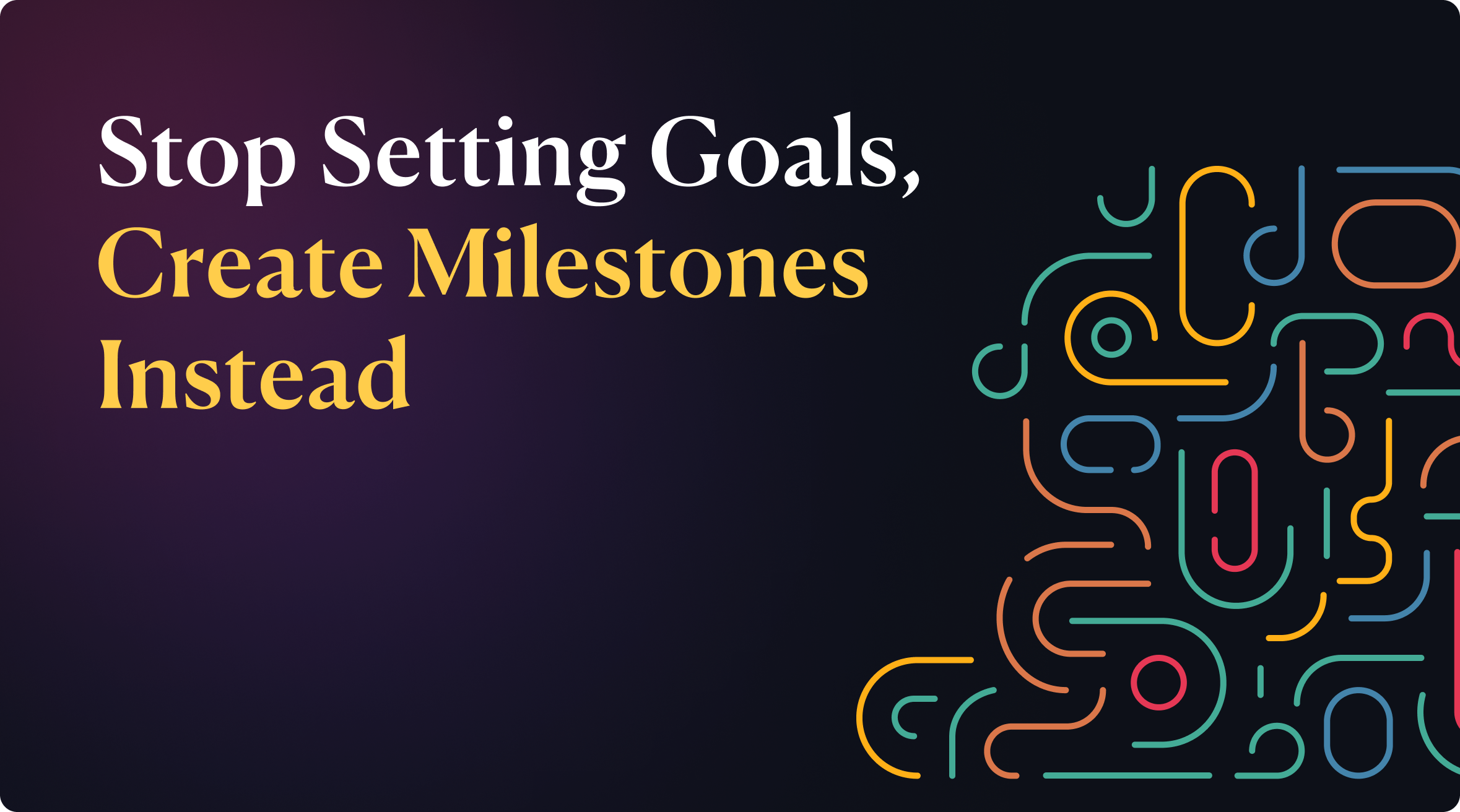Stop setting goals, create milestones instead
 Pavan Kumar
Pavan Kumar
The goals, dreams, missions, and whatnot, we've been in this cycle since childhood. Recently, I had an eye-opening realization that many of the goals we set are often naive and lack the necessary depth to guide us on our journey.
It's not uncommon to find ourselves feeling lost or uncertain along the way, trying different directions in hopes of reaching our goals. If you can relate to this struggle, then you've come to the right place. It's time to break free from this pattern and rethink the way we approach goal-setting to ensure success.
So, how can we transform our goal-setting process and create a well-defined path toward achieving our dreams? Here's how I was able to change my way of achieving goals. Of course, this was possible due to some guidance, which I've linked at the end of this blog.
Note: While this blog focuses on a developer's perspective, the principles discussed can be applied to any goals or dreams in general.
So you have a goal, now what?
Imagine this: you're lost in a sea of thoughts, brimming with exciting ideas. Now comes the tricky part—do you turn every single one into a goal, or do you wisely pick a few to focus on? Well, in my case, here's what I set my sights on:
Get back to writing blogs, and sharing my thoughts and experiences.
Build awesome SaSS products that solve real problems.
Contribute to open-source projects and give back to the community.
Dive into the world of Rust development and master the language.
Dive deeper into the vast wonders of the React ecosystem.
Sounds pretty good, right?
But here's the catch: if you take a closer look at my goals, you'll realize that they're just scratching the surface. The real issue lies in the lack of a clear path to achieve them. For instance, the goal of building awesome SaSS products that solve real problems. The problem is, I don't have a clue what specific products to build. It's like being stranded in the middle of the ocean, unsure of which direction to swim in.
Now, let's take a moment to reflect on all the goals you've set for yourself. Ask yourself these questions:
Does this goal provide clear guidance on how to get started?
Does this goal outline a way to measure your progress along the way?
Does this goal indicate what the end result or achievement looks like?
If any of your goals fail to address these questions, my friend, you're just like me—stranded in the middle of the ocean without a clear direction.

Try creating milestones instead
The common issue among the above goals is not just the lack of a clear path, but also the absence of deep thoughts and desires
Consider "Get back to writing blogs, and sharing my thoughts and experiences". This is a very simple and naive thought, but what is my desire here? Just to write some blogs? off course no.
My thought here should be about creating value within a specific community by writing blogs. For example, I wanna contribute to the Web development community, by writing blogs on React advanced concepts.
Just imagine the tremendous impact a simple shift in our thoughts can make.
| Get back to writing blogs, and sharing my thoughts and experiences | I wanna contribute to the Web development community, by writing blogs on React's advanced concepts |
| 🤔 What do I write? | ✅ I would write on React and it's adv concepts |
| 🤔 How do I consider my progress? just views? | ✅ I would measure my progress based on page views, my followers, and community feedback |
| 🤔 who is my target audience? | ✅ My target audience would be the web development community |
Let's consider a common example, Job Search.
Finding a job is a common goal for many, whether you're a developer, marketing analyst, or non-tech professional. At some point, we all face this challenge and strive to achieve it.
If your goal was just
"I wanna find a Job in X field"
Now, validate this goal of yours. Did you find a path? No, right? All it did was create another question, How to find that Job you're looking for?
Convert to milestones
Step 1: Reach out to people
Find your community: Connect with like-minded individuals in your field by joining industry-specific circles. For tech, Twitter can be a valuable platform, while LinkedIn is often preferred for marketing and other professions. Research and explore different platforms to find where professionals in your domain actively engage.
Spy on orgs: Once you've identified your community, dive deeper into the companies they work for. Investigate the company's purpose, culture, clients, and products/services. Check their reputation on platforms like Glassdoor. If you're interested, visit their career portal for job openings. If not, reach out to employees directly on LinkedIn through cold DMs, understanding that response rates may vary.
Master the 5-second rule: Grab the recruiter's attention by ensuring your resume is concise and impactful. Include essential details within the first 5 seconds of reading. Focus on personal details, relevant experience/projects, and notable achievements. Keep unnecessary information, such as hobbies and TV preferences, to a minimum.
Tailor your resume: Utilize tools like ChatGPT to analyze job descriptions and extract keywords. Incorporate these keywords strategically into your resume, especially when applying to larger corporations that employ software for initial screening. This optimization can increase your chances of standing out to recruiters.
Step 2: Follow up once or twice not more than that
If you haven't received a response from an employer or the person you DM'd, don't hesitate to follow up more than once. It's possible that your message got overlooked or they were busy at the time.
Step 3: Dealing with failure
Sometimes, despite applying to numerous companies, you may not receive positive responses from all of them. In such cases, it's important not to simply reapply without considering the underlying issue.
Take the time to seek feedback on why you weren't selected, and if feedback isn't available, reflect on possible reasons yourself.
In today's competitive landscape, it's crucial to diversify your skills. Relying solely on one skill may not be sufficient, especially with advancing technologies like AI. Explore related roles based on your interests. For example, if you're in business, consider marketing, sales, or communication positions.
Avoid accepting low-wage jobs just for the sake of experience. Research market salaries and hold out for better opportunities, I know it sucks, but stay optimistic and keep searching, as a better opportunity awaits you.
Step 4: Prepare for interviews
Prepare for interviews by dressing professionally, ensuring a quiet environment, and having good audio and video quality. Remember, politeness matters more than your background or education. Stay confident and approach the interview as someone actively seeking a job opportunity.
Personal Opinion
In this blog, I share my personal experience with this approach, which has helped me increase productivity and maintain focus without feeling overwhelmed. This is the video from Theo that helped me.
I encourage you to give it a try and share your feedback in the comments. Implementing this approach can bring about positive changes in your life. Good luck.
Subscribe to my newsletter
Read articles from Pavan Kumar directly inside your inbox. Subscribe to the newsletter, and don't miss out.
Written by

Pavan Kumar
Pavan Kumar
Hey, Pavan here I'm a Full stack and Blockchain dev with over 4 years of experience, and I also co-founded Duolearn to help people succeed in tech rather than just getting started. Demon Slayer corps 😬